A Research Proposal on Leadership in Early Childhood Education
VerifiedAdded on 2024/05/23
|9
|1595
|63
Report
AI Summary
This research proposal explores leadership in early childhood education, focusing on the impact of leadership quality on children's education and the role of frameworks like the National Quality Framework (NQF) and Early Years Foundation Stage (EYFS). It addresses issues such as childhood obesity and the integration of indigenous perspectives into childcare services. The proposal outlines a qualitative literature review approach, examining peer-reviewed articles and the efficacy of coaching and mentoring methodologies. It also includes a timeline for the proposed research, limitations, and delimitations, ultimately arguing for the empowerment of children through leadership development from an early age to improve cultural understanding and address problems like obesity.
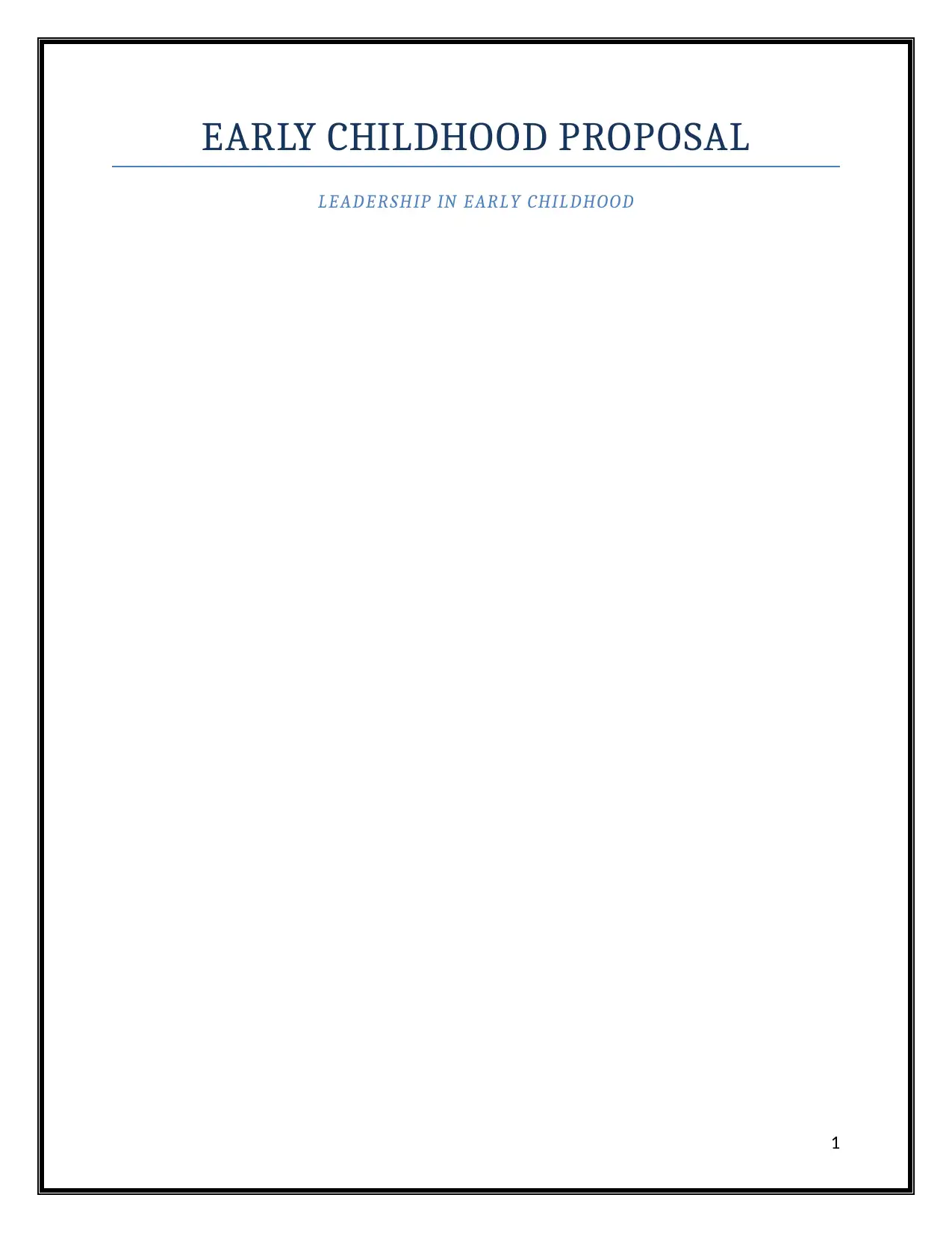
EARLY CHILDHOOD PROPOSAL
LEADERSHIP IN EARLY CHILDHOOD
1
LEADERSHIP IN EARLY CHILDHOOD
1
Paraphrase This Document
Need a fresh take? Get an instant paraphrase of this document with our AI Paraphraser
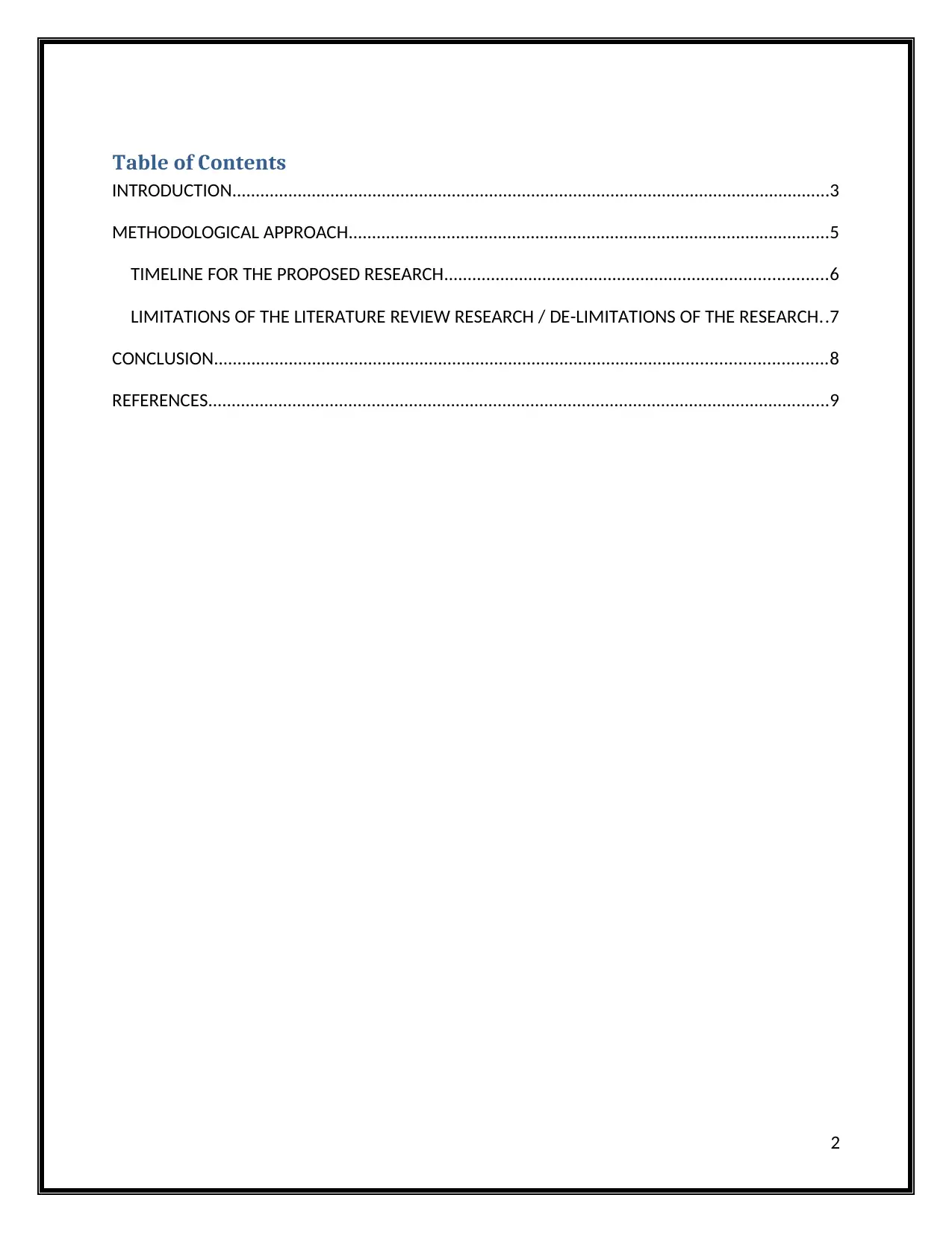
Table of Contents
INTRODUCTION................................................................................................................................3
METHODOLOGICAL APPROACH.......................................................................................................5
TIMELINE FOR THE PROPOSED RESEARCH..................................................................................6
LIMITATIONS OF THE LITERATURE REVIEW RESEARCH / DE-LIMITATIONS OF THE RESEARCH..7
CONCLUSION...................................................................................................................................8
REFERENCES.....................................................................................................................................9
2
INTRODUCTION................................................................................................................................3
METHODOLOGICAL APPROACH.......................................................................................................5
TIMELINE FOR THE PROPOSED RESEARCH..................................................................................6
LIMITATIONS OF THE LITERATURE REVIEW RESEARCH / DE-LIMITATIONS OF THE RESEARCH..7
CONCLUSION...................................................................................................................................8
REFERENCES.....................................................................................................................................9
2
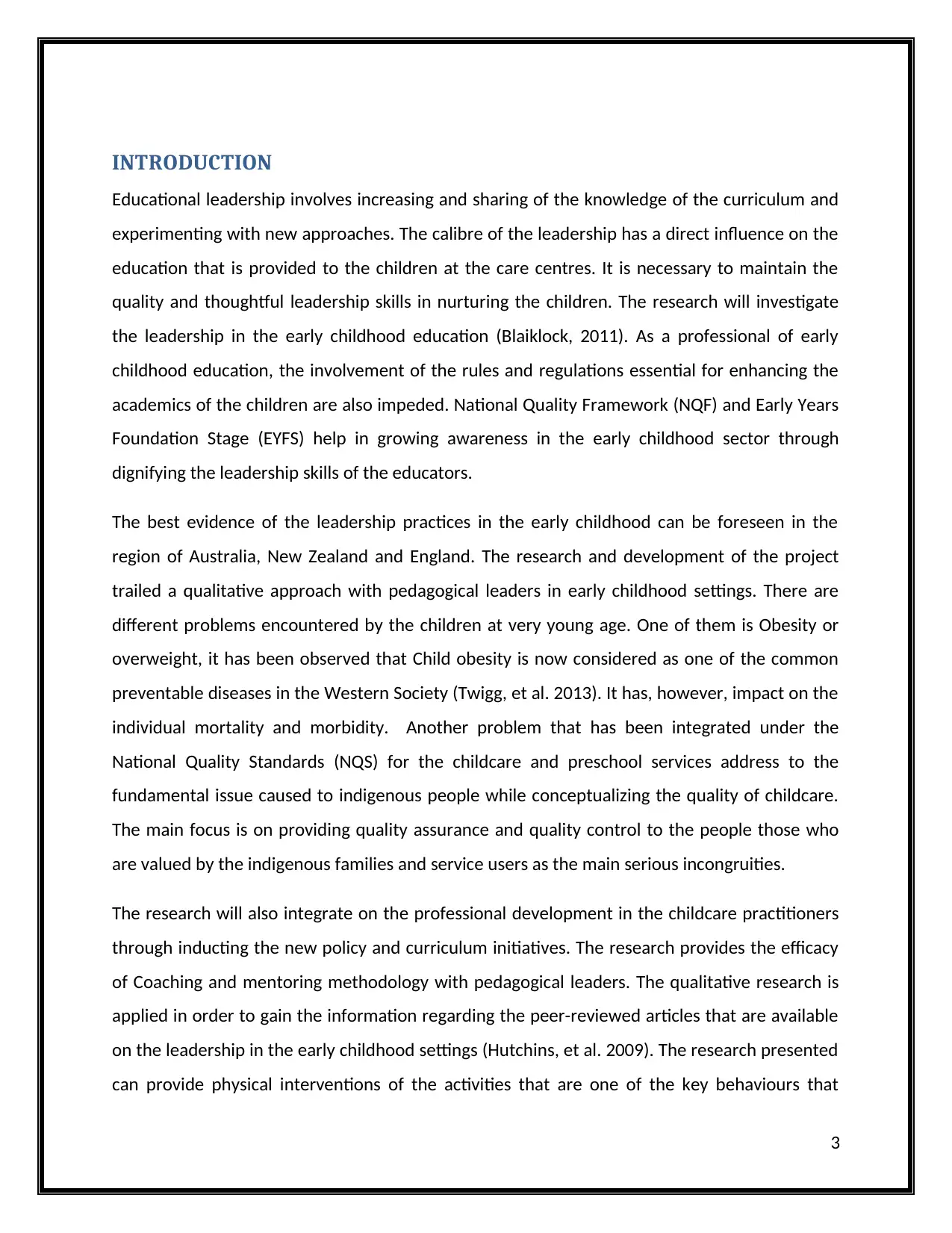
INTRODUCTION
Educational leadership involves increasing and sharing of the knowledge of the curriculum and
experimenting with new approaches. The calibre of the leadership has a direct influence on the
education that is provided to the children at the care centres. It is necessary to maintain the
quality and thoughtful leadership skills in nurturing the children. The research will investigate
the leadership in the early childhood education (Blaiklock, 2011). As a professional of early
childhood education, the involvement of the rules and regulations essential for enhancing the
academics of the children are also impeded. National Quality Framework (NQF) and Early Years
Foundation Stage (EYFS) help in growing awareness in the early childhood sector through
dignifying the leadership skills of the educators.
The best evidence of the leadership practices in the early childhood can be foreseen in the
region of Australia, New Zealand and England. The research and development of the project
trailed a qualitative approach with pedagogical leaders in early childhood settings. There are
different problems encountered by the children at very young age. One of them is Obesity or
overweight, it has been observed that Child obesity is now considered as one of the common
preventable diseases in the Western Society (Twigg, et al. 2013). It has, however, impact on the
individual mortality and morbidity. Another problem that has been integrated under the
National Quality Standards (NQS) for the childcare and preschool services address to the
fundamental issue caused to indigenous people while conceptualizing the quality of childcare.
The main focus is on providing quality assurance and quality control to the people those who
are valued by the indigenous families and service users as the main serious incongruities.
The research will also integrate on the professional development in the childcare practitioners
through inducting the new policy and curriculum initiatives. The research provides the efficacy
of Coaching and mentoring methodology with pedagogical leaders. The qualitative research is
applied in order to gain the information regarding the peer-reviewed articles that are available
on the leadership in the early childhood settings (Hutchins, et al. 2009). The research presented
can provide physical interventions of the activities that are one of the key behaviours that
3
Educational leadership involves increasing and sharing of the knowledge of the curriculum and
experimenting with new approaches. The calibre of the leadership has a direct influence on the
education that is provided to the children at the care centres. It is necessary to maintain the
quality and thoughtful leadership skills in nurturing the children. The research will investigate
the leadership in the early childhood education (Blaiklock, 2011). As a professional of early
childhood education, the involvement of the rules and regulations essential for enhancing the
academics of the children are also impeded. National Quality Framework (NQF) and Early Years
Foundation Stage (EYFS) help in growing awareness in the early childhood sector through
dignifying the leadership skills of the educators.
The best evidence of the leadership practices in the early childhood can be foreseen in the
region of Australia, New Zealand and England. The research and development of the project
trailed a qualitative approach with pedagogical leaders in early childhood settings. There are
different problems encountered by the children at very young age. One of them is Obesity or
overweight, it has been observed that Child obesity is now considered as one of the common
preventable diseases in the Western Society (Twigg, et al. 2013). It has, however, impact on the
individual mortality and morbidity. Another problem that has been integrated under the
National Quality Standards (NQS) for the childcare and preschool services address to the
fundamental issue caused to indigenous people while conceptualizing the quality of childcare.
The main focus is on providing quality assurance and quality control to the people those who
are valued by the indigenous families and service users as the main serious incongruities.
The research will also integrate on the professional development in the childcare practitioners
through inducting the new policy and curriculum initiatives. The research provides the efficacy
of Coaching and mentoring methodology with pedagogical leaders. The qualitative research is
applied in order to gain the information regarding the peer-reviewed articles that are available
on the leadership in the early childhood settings (Hutchins, et al. 2009). The research presented
can provide physical interventions of the activities that are one of the key behaviours that
3
⊘ This is a preview!⊘
Do you want full access?
Subscribe today to unlock all pages.

Trusted by 1+ million students worldwide
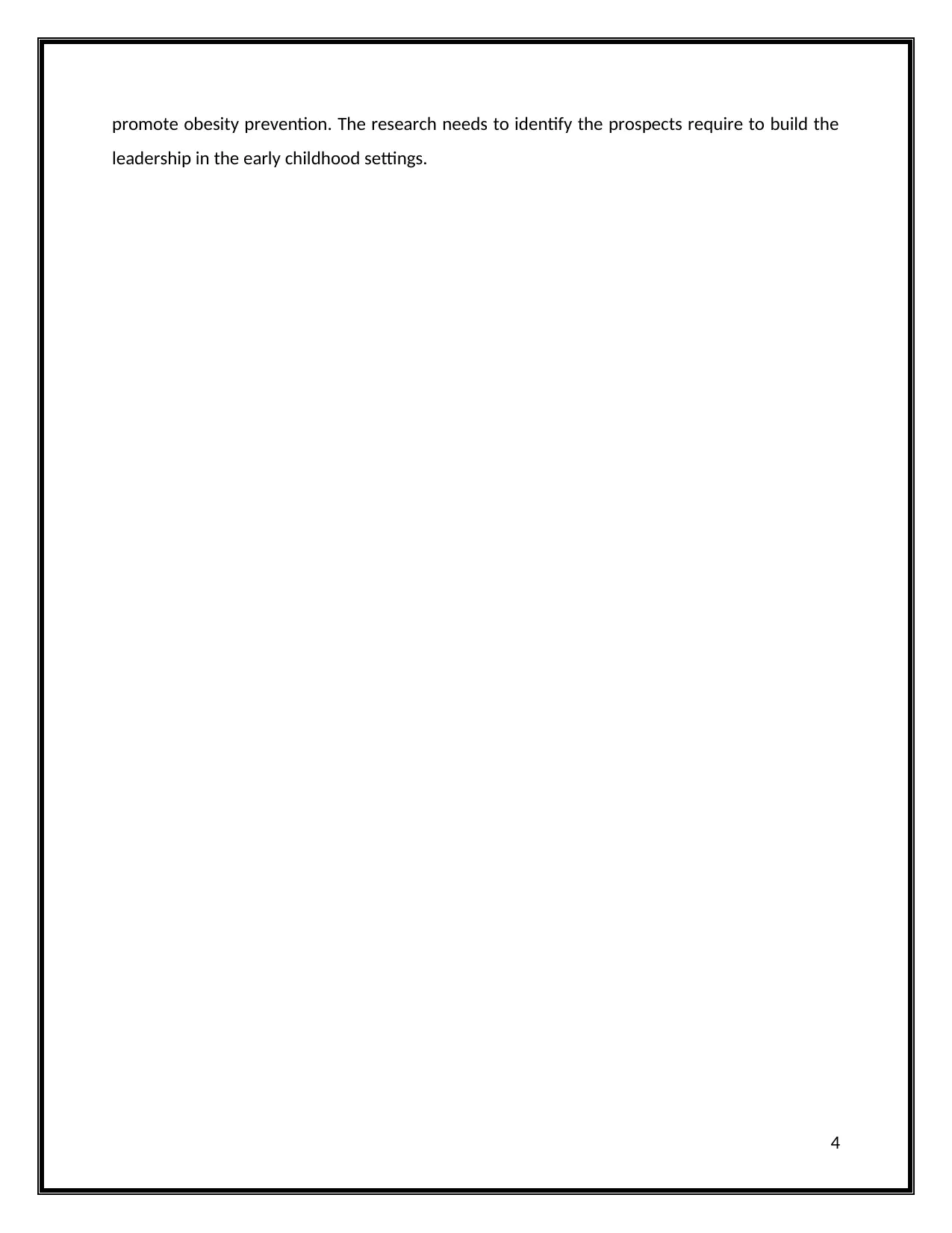
promote obesity prevention. The research needs to identify the prospects require to build the
leadership in the early childhood settings.
4
leadership in the early childhood settings.
4
Paraphrase This Document
Need a fresh take? Get an instant paraphrase of this document with our AI Paraphraser
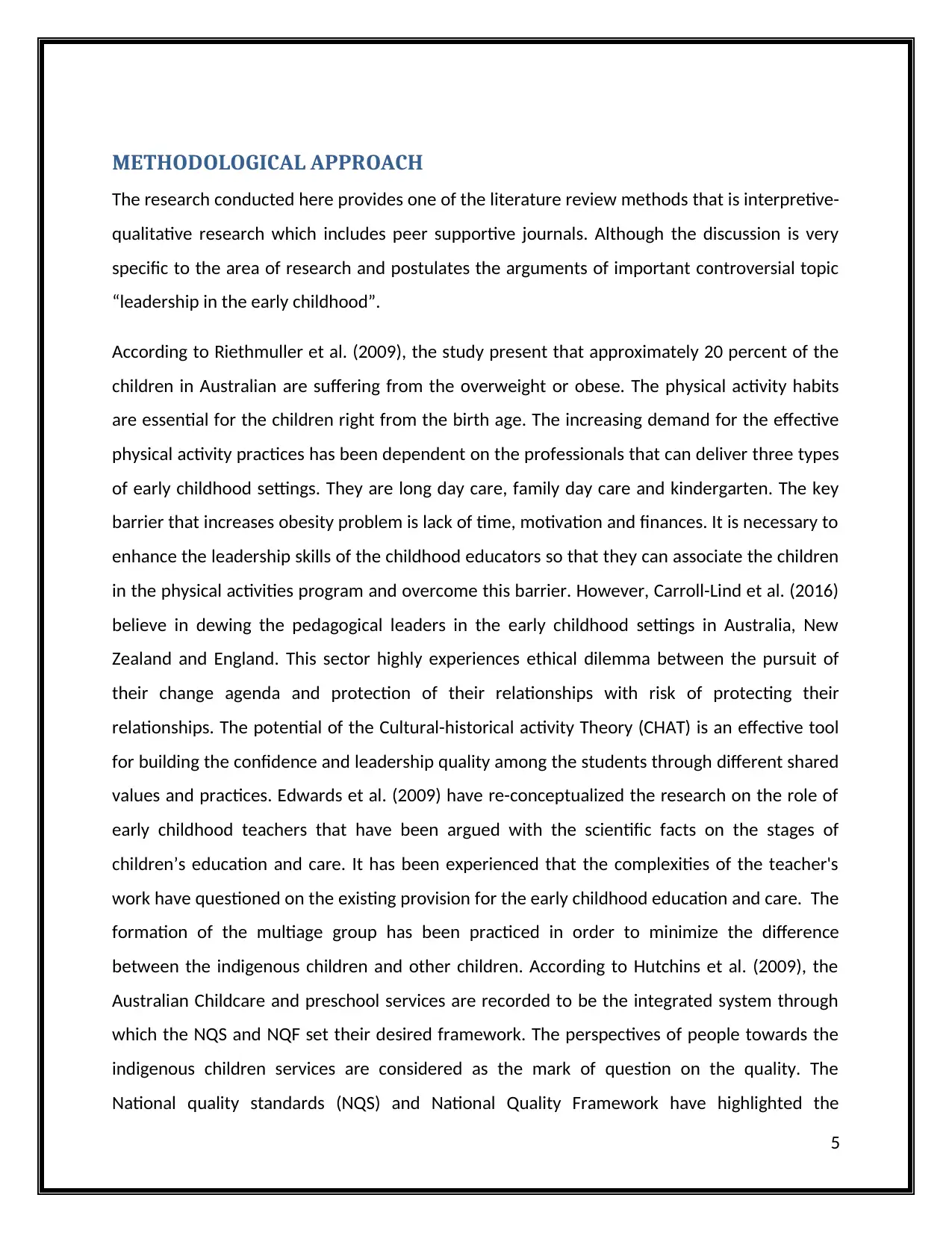
METHODOLOGICAL APPROACH
The research conducted here provides one of the literature review methods that is interpretive-
qualitative research which includes peer supportive journals. Although the discussion is very
specific to the area of research and postulates the arguments of important controversial topic
“leadership in the early childhood”.
According to Riethmuller et al. (2009), the study present that approximately 20 percent of the
children in Australian are suffering from the overweight or obese. The physical activity habits
are essential for the children right from the birth age. The increasing demand for the effective
physical activity practices has been dependent on the professionals that can deliver three types
of early childhood settings. They are long day care, family day care and kindergarten. The key
barrier that increases obesity problem is lack of time, motivation and finances. It is necessary to
enhance the leadership skills of the childhood educators so that they can associate the children
in the physical activities program and overcome this barrier. However, Carroll-Lind et al. (2016)
believe in dewing the pedagogical leaders in the early childhood settings in Australia, New
Zealand and England. This sector highly experiences ethical dilemma between the pursuit of
their change agenda and protection of their relationships with risk of protecting their
relationships. The potential of the Cultural-historical activity Theory (CHAT) is an effective tool
for building the confidence and leadership quality among the students through different shared
values and practices. Edwards et al. (2009) have re-conceptualized the research on the role of
early childhood teachers that have been argued with the scientific facts on the stages of
children’s education and care. It has been experienced that the complexities of the teacher's
work have questioned on the existing provision for the early childhood education and care. The
formation of the multiage group has been practiced in order to minimize the difference
between the indigenous children and other children. According to Hutchins et al. (2009), the
Australian Childcare and preschool services are recorded to be the integrated system through
which the NQS and NQF set their desired framework. The perspectives of people towards the
indigenous children services are considered as the mark of question on the quality. The
National quality standards (NQS) and National Quality Framework have highlighted the
5
The research conducted here provides one of the literature review methods that is interpretive-
qualitative research which includes peer supportive journals. Although the discussion is very
specific to the area of research and postulates the arguments of important controversial topic
“leadership in the early childhood”.
According to Riethmuller et al. (2009), the study present that approximately 20 percent of the
children in Australian are suffering from the overweight or obese. The physical activity habits
are essential for the children right from the birth age. The increasing demand for the effective
physical activity practices has been dependent on the professionals that can deliver three types
of early childhood settings. They are long day care, family day care and kindergarten. The key
barrier that increases obesity problem is lack of time, motivation and finances. It is necessary to
enhance the leadership skills of the childhood educators so that they can associate the children
in the physical activities program and overcome this barrier. However, Carroll-Lind et al. (2016)
believe in dewing the pedagogical leaders in the early childhood settings in Australia, New
Zealand and England. This sector highly experiences ethical dilemma between the pursuit of
their change agenda and protection of their relationships with risk of protecting their
relationships. The potential of the Cultural-historical activity Theory (CHAT) is an effective tool
for building the confidence and leadership quality among the students through different shared
values and practices. Edwards et al. (2009) have re-conceptualized the research on the role of
early childhood teachers that have been argued with the scientific facts on the stages of
children’s education and care. It has been experienced that the complexities of the teacher's
work have questioned on the existing provision for the early childhood education and care. The
formation of the multiage group has been practiced in order to minimize the difference
between the indigenous children and other children. According to Hutchins et al. (2009), the
Australian Childcare and preschool services are recorded to be the integrated system through
which the NQS and NQF set their desired framework. The perspectives of people towards the
indigenous children services are considered as the mark of question on the quality. The
National quality standards (NQS) and National Quality Framework have highlighted the
5
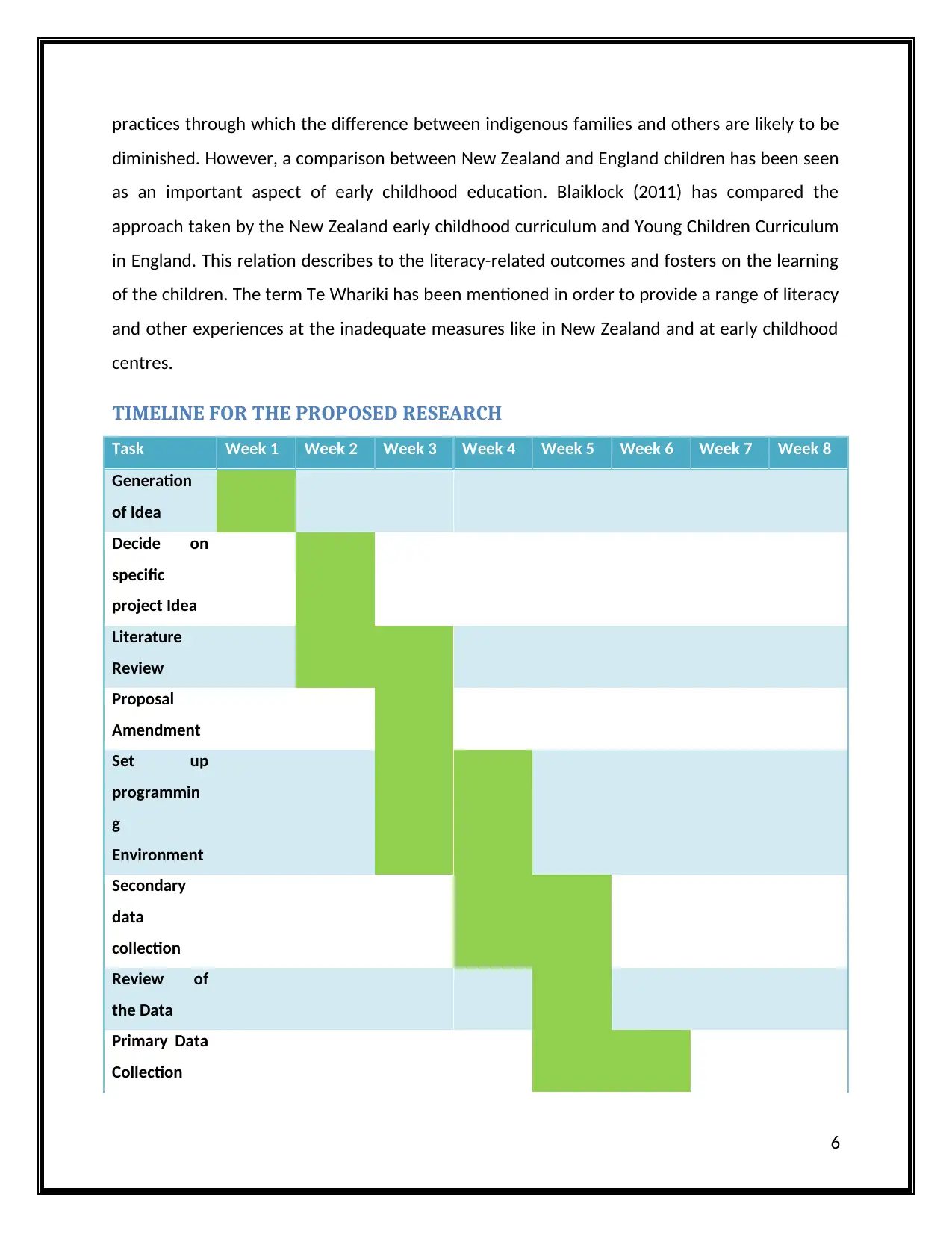
practices through which the difference between indigenous families and others are likely to be
diminished. However, a comparison between New Zealand and England children has been seen
as an important aspect of early childhood education. Blaiklock (2011) has compared the
approach taken by the New Zealand early childhood curriculum and Young Children Curriculum
in England. This relation describes to the literacy-related outcomes and fosters on the learning
of the children. The term Te Whariki has been mentioned in order to provide a range of literacy
and other experiences at the inadequate measures like in New Zealand and at early childhood
centres.
TIMELINE FOR THE PROPOSED RESEARCH
Task Week 1 Week 2 Week 3 Week 4 Week 5 Week 6 Week 7 Week 8
Generation
of Idea
Decide on
specific
project Idea
Literature
Review
Proposal
Amendment
Set up
programmin
g
Environment
Secondary
data
collection
Review of
the Data
Primary Data
Collection
6
diminished. However, a comparison between New Zealand and England children has been seen
as an important aspect of early childhood education. Blaiklock (2011) has compared the
approach taken by the New Zealand early childhood curriculum and Young Children Curriculum
in England. This relation describes to the literacy-related outcomes and fosters on the learning
of the children. The term Te Whariki has been mentioned in order to provide a range of literacy
and other experiences at the inadequate measures like in New Zealand and at early childhood
centres.
TIMELINE FOR THE PROPOSED RESEARCH
Task Week 1 Week 2 Week 3 Week 4 Week 5 Week 6 Week 7 Week 8
Generation
of Idea
Decide on
specific
project Idea
Literature
Review
Proposal
Amendment
Set up
programmin
g
Environment
Secondary
data
collection
Review of
the Data
Primary Data
Collection
6
⊘ This is a preview!⊘
Do you want full access?
Subscribe today to unlock all pages.

Trusted by 1+ million students worldwide
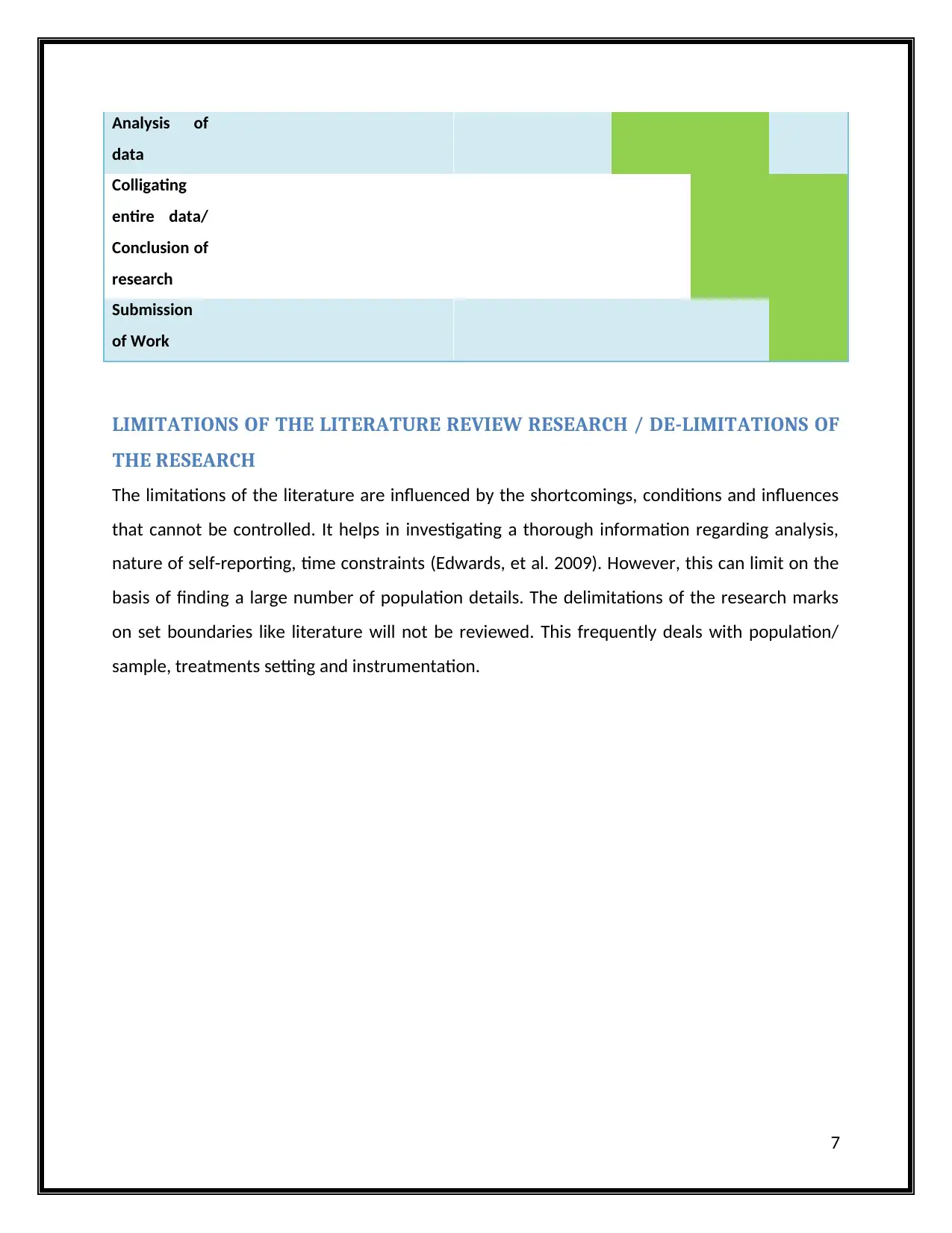
Analysis of
data
Colligating
entire data/
Conclusion of
research
Submission
of Work
LIMITATIONS OF THE LITERATURE REVIEW RESEARCH / DE-LIMITATIONS OF
THE RESEARCH
The limitations of the literature are influenced by the shortcomings, conditions and influences
that cannot be controlled. It helps in investigating a thorough information regarding analysis,
nature of self-reporting, time constraints (Edwards, et al. 2009). However, this can limit on the
basis of finding a large number of population details. The delimitations of the research marks
on set boundaries like literature will not be reviewed. This frequently deals with population/
sample, treatments setting and instrumentation.
7
data
Colligating
entire data/
Conclusion of
research
Submission
of Work
LIMITATIONS OF THE LITERATURE REVIEW RESEARCH / DE-LIMITATIONS OF
THE RESEARCH
The limitations of the literature are influenced by the shortcomings, conditions and influences
that cannot be controlled. It helps in investigating a thorough information regarding analysis,
nature of self-reporting, time constraints (Edwards, et al. 2009). However, this can limit on the
basis of finding a large number of population details. The delimitations of the research marks
on set boundaries like literature will not be reviewed. This frequently deals with population/
sample, treatments setting and instrumentation.
7
Paraphrase This Document
Need a fresh take? Get an instant paraphrase of this document with our AI Paraphraser
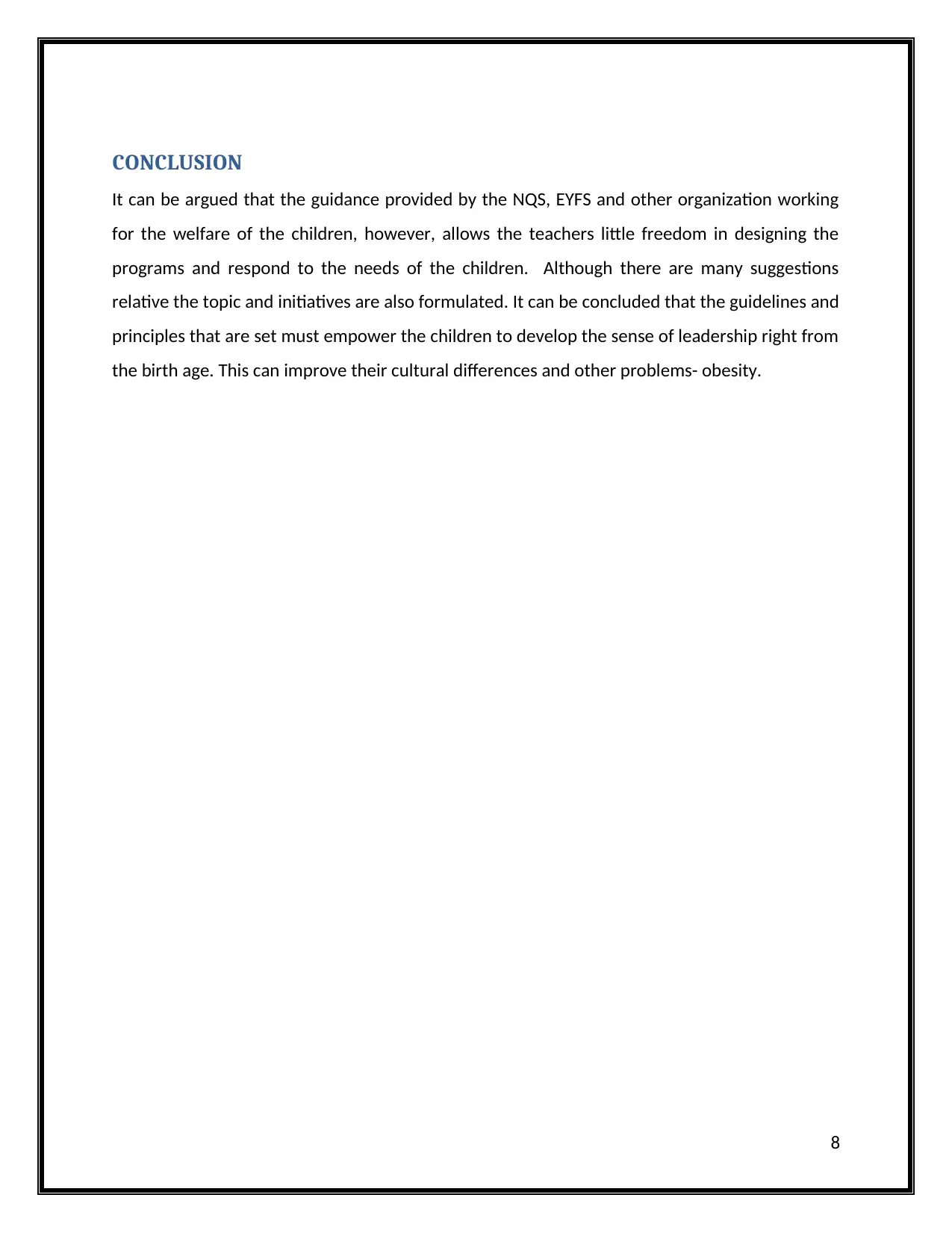
CONCLUSION
It can be argued that the guidance provided by the NQS, EYFS and other organization working
for the welfare of the children, however, allows the teachers little freedom in designing the
programs and respond to the needs of the children. Although there are many suggestions
relative the topic and initiatives are also formulated. It can be concluded that the guidelines and
principles that are set must empower the children to develop the sense of leadership right from
the birth age. This can improve their cultural differences and other problems- obesity.
8
It can be argued that the guidance provided by the NQS, EYFS and other organization working
for the welfare of the children, however, allows the teachers little freedom in designing the
programs and respond to the needs of the children. Although there are many suggestions
relative the topic and initiatives are also formulated. It can be concluded that the guidelines and
principles that are set must empower the children to develop the sense of leadership right from
the birth age. This can improve their cultural differences and other problems- obesity.
8
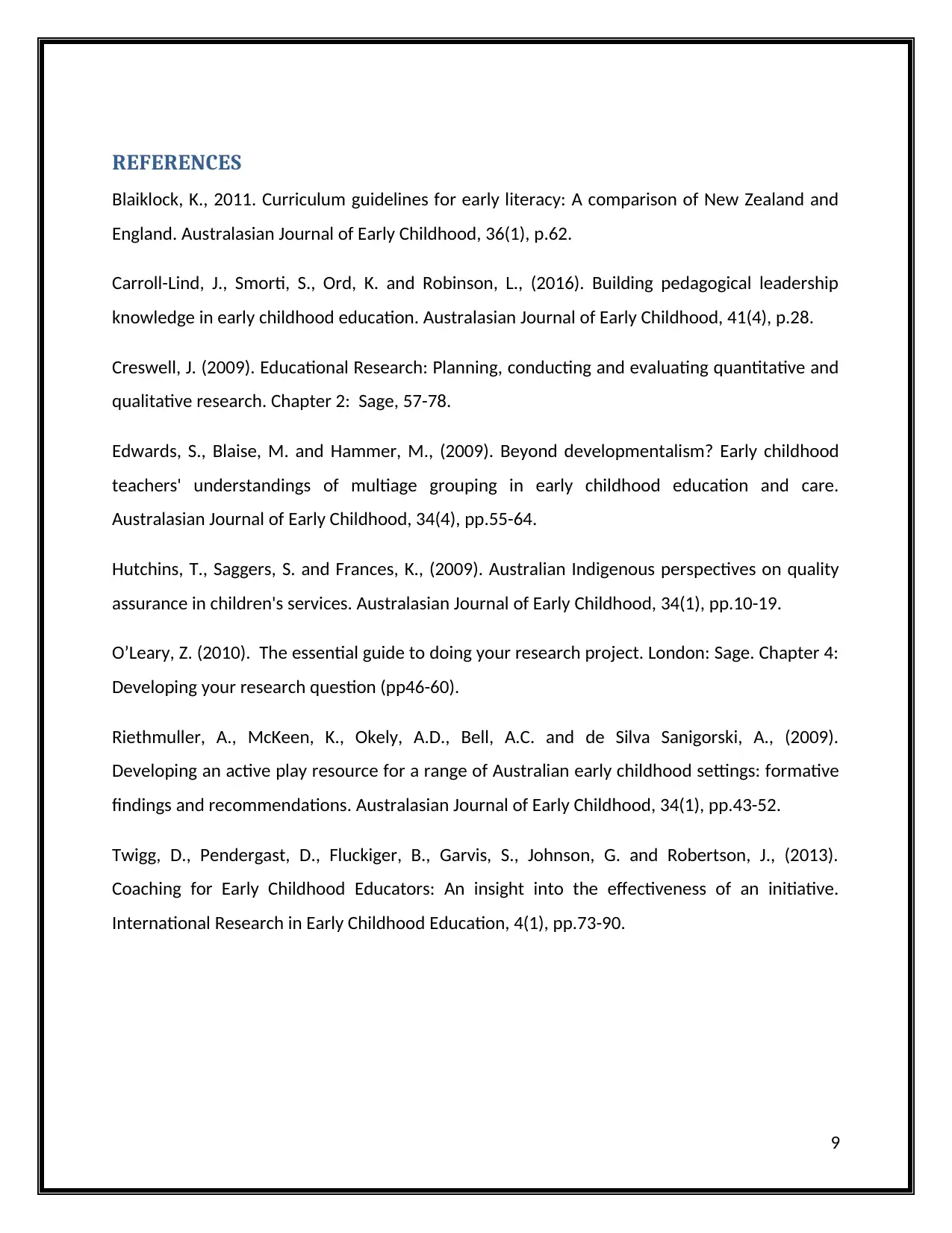
REFERENCES
Blaiklock, K., 2011. Curriculum guidelines for early literacy: A comparison of New Zealand and
England. Australasian Journal of Early Childhood, 36(1), p.62.
Carroll-Lind, J., Smorti, S., Ord, K. and Robinson, L., (2016). Building pedagogical leadership
knowledge in early childhood education. Australasian Journal of Early Childhood, 41(4), p.28.
Creswell, J. (2009). Educational Research: Planning, conducting and evaluating quantitative and
qualitative research. Chapter 2: Sage, 57-78.
Edwards, S., Blaise, M. and Hammer, M., (2009). Beyond developmentalism? Early childhood
teachers' understandings of multiage grouping in early childhood education and care.
Australasian Journal of Early Childhood, 34(4), pp.55-64.
Hutchins, T., Saggers, S. and Frances, K., (2009). Australian Indigenous perspectives on quality
assurance in children's services. Australasian Journal of Early Childhood, 34(1), pp.10-19.
O’Leary, Z. (2010). The essential guide to doing your research project. London: Sage. Chapter 4:
Developing your research question (pp46-60).
Riethmuller, A., McKeen, K., Okely, A.D., Bell, A.C. and de Silva Sanigorski, A., (2009).
Developing an active play resource for a range of Australian early childhood settings: formative
findings and recommendations. Australasian Journal of Early Childhood, 34(1), pp.43-52.
Twigg, D., Pendergast, D., Fluckiger, B., Garvis, S., Johnson, G. and Robertson, J., (2013).
Coaching for Early Childhood Educators: An insight into the effectiveness of an initiative.
International Research in Early Childhood Education, 4(1), pp.73-90.
9
Blaiklock, K., 2011. Curriculum guidelines for early literacy: A comparison of New Zealand and
England. Australasian Journal of Early Childhood, 36(1), p.62.
Carroll-Lind, J., Smorti, S., Ord, K. and Robinson, L., (2016). Building pedagogical leadership
knowledge in early childhood education. Australasian Journal of Early Childhood, 41(4), p.28.
Creswell, J. (2009). Educational Research: Planning, conducting and evaluating quantitative and
qualitative research. Chapter 2: Sage, 57-78.
Edwards, S., Blaise, M. and Hammer, M., (2009). Beyond developmentalism? Early childhood
teachers' understandings of multiage grouping in early childhood education and care.
Australasian Journal of Early Childhood, 34(4), pp.55-64.
Hutchins, T., Saggers, S. and Frances, K., (2009). Australian Indigenous perspectives on quality
assurance in children's services. Australasian Journal of Early Childhood, 34(1), pp.10-19.
O’Leary, Z. (2010). The essential guide to doing your research project. London: Sage. Chapter 4:
Developing your research question (pp46-60).
Riethmuller, A., McKeen, K., Okely, A.D., Bell, A.C. and de Silva Sanigorski, A., (2009).
Developing an active play resource for a range of Australian early childhood settings: formative
findings and recommendations. Australasian Journal of Early Childhood, 34(1), pp.43-52.
Twigg, D., Pendergast, D., Fluckiger, B., Garvis, S., Johnson, G. and Robertson, J., (2013).
Coaching for Early Childhood Educators: An insight into the effectiveness of an initiative.
International Research in Early Childhood Education, 4(1), pp.73-90.
9
⊘ This is a preview!⊘
Do you want full access?
Subscribe today to unlock all pages.

Trusted by 1+ million students worldwide
1 out of 9
Related Documents
Your All-in-One AI-Powered Toolkit for Academic Success.
+13062052269
info@desklib.com
Available 24*7 on WhatsApp / Email
![[object Object]](/_next/static/media/star-bottom.7253800d.svg)
Unlock your academic potential
Copyright © 2020–2026 A2Z Services. All Rights Reserved. Developed and managed by ZUCOL.





